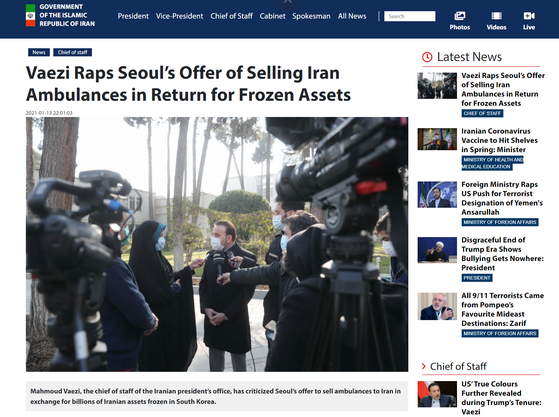The first vice minister of the Ministry of Foreign Affairs Choi Jong-gun returned home on the 14th without addressing the issue of detaining Korean ships, and the Iranian government said, “Korea refused to buy an ambulance with frozen funds.” In order to pressure South Korea, it unilaterally disclosed the details of diplomatic negotiations.
Detention negotiations for empty-handed return homes, controversy over lack of diplomatic power
According to the Iranian announcement, the homework of’American Persuasion’
Iranian President’s Secretary Mahmoud Baejji said on the Iranian government website on the 13th (local time), “The Korean delegation refused to offer to buy and provide an ambulance with frozen funds from the Iranian Central Bank.” “We don’t need a few ambulances. He said, “I am bound by Korea and are asking for money that must be returned,” he said. “The Iranian foreign ministry and central bank officials responded clearly to the Korean delegation.” He also referred to the Korean delegation as’Koreans’, and insisted that “we promised to obtain permission for the Koreans to release frozen funds after returning to Korea.”
![The position of Iran's presidential secretary, Mahmoud Baejji, published on the Iranian government website [이란 정부 홈페이지]](https://i0.wp.com/pds.joins.com/news/component/htmlphoto_mmdata/202101/14/7be89a0f-d7e2-41b4-8156-5a6797abae0b.jpg?w=560&ssl=1)
The position of Iran’s presidential secretary, Mahmoud Baejji, published on the Iranian government website [이란 정부 홈페이지]
Regarding this, an official from the Ministry of Foreign Affairs said, “In the process of discussing various measures, Iran hoped to introduce an ambulance.” It is explained that the introduction of an ambulance is a method that Iran had discussed first because it wanted it first. However, the expression “different from the truth” itself can be viewed as a de facto expression of regret. Usually, the contents of high-level diplomatic talks are announced by the two sides. It is a diplomatic custom to include in the official presentation even if the other party is uncomfortable with minimal understanding. However, Iran ignored this and unveiled the South Korean proposal, highlighting only some of it.
The negotiators were sent, but they were used by Iran and evaluated.
In spite of such diplomatic rudeness from the Iranian side, criticism that the government, which initially announced that it would negotiate with a’creative plan’, could not actually press the Iranian side or prepare a card to persuade it is expected to be inevitable. It is pointed out that if it was decided to dispatch a diplomatic negotiation team, it would have to have gone through meticulous preliminary strategies and conditions, but was surprised by the’detention of Korean ships’. As a result, it is evaluated that Iran used it as an opportunity to press the South Korean government while showing off their firm position over the visit of the Korean Foreign Ministry’s negotiation team. From Iran’s public on the day, Vice Minister Choi and his party promised Iran to “persuade the United States” to release the frozen funds and rather return home with their homework.
In the midst of this, the Iranian side claimed to have been “the best courtesy” of Choi’s visit to Iran. According to diplomatic sources, the reason that the Iranian side was able to meet with the Iranian foreign minister, Zarif, who was higher in class than him, was “because the Iranian government raised the level of treatment to vice-minister Choi and cooperated to meet the person who requested interview as much as possible. He said that he explained. Deputy Vice Minister Choi said that the visit to Iran was virtually ended empty-handed and conveyed to the Iranian side that “I came to understand the situation, and now that I have understood the situation, I will recreate the meeting place with sufficient answers.” In addition, it is an analysis that he invited Foreign Minister Abbas Arakchi, who was a partner in negotiations, to Korea.
![Choi Jong-gun, the first vice minister of the Ministry of Foreign Affairs, interviewed Iranian Foreign Minister Mohammad Javad Jarif in Tehran, Iran on the 11th (local time). [이란 외무부]](https://i0.wp.com/pds.joins.com/news/component/htmlphoto_mmdata/202101/14/8b9587e6-f249-427a-957f-63997ed67a6f.jpg?w=560&ssl=1)
Choi Jong-gun, the first vice minister of the Ministry of Foreign Affairs, interviewed Iranian Foreign Minister Mohammad Javad Jarif in Tehran, Iran on the 11th (local time). [이란 외무부]
Vice Minister Choi visited Qatar on the 13th (local time) before returning home after visiting Iran for 3 days and 2 nights. Mr. Mohamed bin Abdullahman bin Jasim al Sani met with high-ranking officials including Qatar Deputy Prime Minister and Minister of Foreign Affairs and asked for assistance in the issue of Korean ships and crew detained in Iran. The Ministry of Foreign Affairs said that Vice Minister Choi had requested “to give Qatar the maximum support possible.” Qatar maintains relatively friendly relations with Iran among neighboring countries. However, it is unclear how effective it will be to ask a third country to cooperate on a problem that could not be solved in the bilateral consultations between Korea and Iran.
Reporter Park Hyun-joo [email protected]
